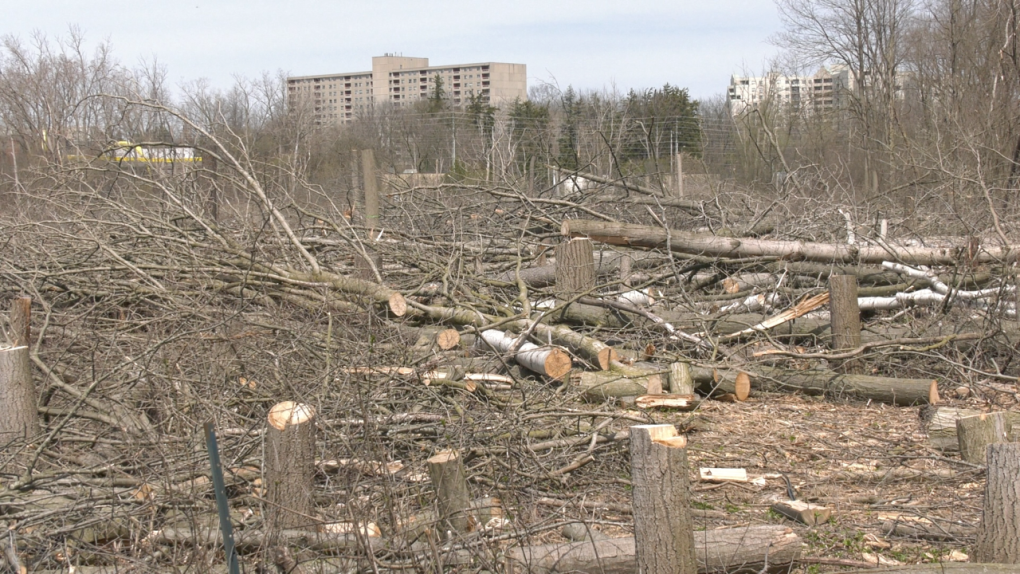UTRCA approves multi-zone flood plain plan for west London watershed
 Clearing of trees has taken place on the Mud Creek watershed in London, Ont. to allow for flood control measures. (Gerry Dewan/CTV News London)
Clearing of trees has taken place on the Mud Creek watershed in London, Ont. to allow for flood control measures. (Gerry Dewan/CTV News London)
There's been a significant breakthrough that could see extensive residential growth along Oxford Street West, east of Wonderland Road in London, Ont.
The Upper Thames River Conservation Authority (UTRCA) has cleared the way for a unique, two-zone approach in the flood plain along the Mud Creek watershed, in west London.
The proposal was approved at the UTRCA board meeting on Tuesday morning.
"Traditionally there's only one floodway,” Board Chair Brian Petrie told CTV News London.
He continued, “This approach signifies that there's a larger floodway and there's fringe areas on it that are less at risk to having some development in them. They still have to be reviewed to make sure they're safe but this opens up possibilities for development where, at one time, it may not have been possible."
The city has engineered flood management strategies to reduce risk along the edges of the flood plain.
 The unique two-zone flood plain approved by the Upper Thames River Conservation Authority on April 16, 2024 will open up an opportunity for thousands of new residential units along Oxford Street West in London, Ont. (Gerry Dewan/CTV News London)
The unique two-zone flood plain approved by the Upper Thames River Conservation Authority on April 16, 2024 will open up an opportunity for thousands of new residential units along Oxford Street West in London, Ont. (Gerry Dewan/CTV News London)
That will open the door for almost 4,000 residential units south of Oxford Street West, just east of Wonderland Road. They would range from townhouses to apartment towers.
The original motion recommended a watershed review every 10 years but an amendment moved by board member Sandy Levin changed the wording to say “at least” every 10 years, allowing for more frequent reviews based on new development proposals or observed impacts caused by the changes.
Anna Hopkins is the councillor for Ward 9 and a member of the UTRCA board, and supports the amendment.
“Corridors change, development changes as we go forward. So, it's keeping an eye, making sure that this two-stage flood plain is safe,” she said.
UTRCA staff said the strategy is also designed to ensure that at risk species are protected and other waterways are not negatively impacted by the changes.
Hopkins said many residents in the area have raised concerns about the clearing of trees and other vegetation in the area.
She said the plan is to restore the greenspace.
 The Upper Thames River Conservation Authority approved a two-zone approach to the Mud Creek flood plain in London, Ont. during a meeting on April 16, 2024. (Gerry Dewan/CTV News London)
The Upper Thames River Conservation Authority approved a two-zone approach to the Mud Creek flood plain in London, Ont. during a meeting on April 16, 2024. (Gerry Dewan/CTV News London)
“I know it looks very raw sometimes when we take down the trees, but what we’re putting back in that plan, naturalizing that river corridor, will create a natural environment that Londoners want to be part of,” she explained.
A statement from Deputy City Manager, Planning & Economic Development Scott Mathers to CTV News London Tuesday evening reads in part:
"The City of London and UTRCA have been working together to support the first two-zone floodplain in the Mud Creek subwatershed in London, which will include a floodway and flood fringe.
The UTRCA’s approval of the two-zone floodplain and flood fringe concept will support the City’s channel works and allow for 56 hectares of infill development that has been on hold for 15 years.
The city’s investment in the built area and environment will reduce the frequency of flooding of a major arterial road, create [two kilometres] of naturalized channel for public access to nature, and allow for infill development to contribute to the City of London’s 47,000 provincial housing target. This is another example of London’s innovation and council’s commitment to accelerate the housing supply and meet London’s pledge."
CTVNews.ca Top Stories

BREAKING Baby, grandparents among 4 people killed in wrong-way police chase on Ontario's Hwy. 401
A police chase which started with a liquor store robbery in Bowmanville Monday night ended in tragedy some 20 minutes later when a suspect fleeing police entered Highway 401 in the wrong direction and caused a pileup which killed an infant and the child's grandparents, as well as the suspect, investigators say.
McGill requests 'police assistance' over pro-Palestinian encampment
McGill University says it has 'requested police assistance' about the pro-Palestinian encampment on its lower field.
Freeland tables motion previewing omnibus budget bill
Deputy Prime Minister and Finance Minister Chrystia Freeland will be tabling yet another omnibus bill to pass the sweeping range of measures promised in her April 16 federal budget.
Judge holds Trump in contempt, fines him US$9,000 and raises threat of jail in hush money trial
Donald Trump was held in contempt of court Tuesday and fined US$9,000 for repeatedly violating a gag order that barred him from making public statements about witnesses, jurors and some others connected to his New York hush money case. If he does it again, the judge warned, he could be jailed.
Air Canada walks back new seat selection policy change after backlash
Air Canada has paused a new seat selection fee for travellers booked on the lowest fares just days after implementing it.
Court upholds Milwaukee police officer's firing for posting racist memes after Sterling Brown arrest
The Wisconsin Supreme Court ruled Tuesday that a former Milwaukee police officer was properly fired for posting racist memes related to the arrest of an NBA player that triggered a public outcry.
New cancer treatment approved, but not everyone thinks it's what's best for patients
A new cancer treatment recently approved in Canada promises to cut treatment time down to just minutes, but experts have differing opinions on whether it's what's best for patients.
T. rex is at the centre of a debate over dinosaur intelligence
Surmising even the physical appearance of a dinosaur - or any extinct animal - based on its fossils is a tricky proposition, with so many uncertainties involved. Assessing a dinosaur's intelligence, considering the innumerable factors contributing to that trait, is exponentially more difficult.
Province boots mayor and council in small northern Ont. town out of office
An ongoing municipal strike, court battles and revolt by half of council has prompted the province to oust the mayor and council in Black River-Matheson.






























